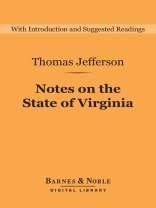Thomas Jefferson’s only book,
Notes on the State of Virginia, is a rich and revealing compendium of information and opinion on the largest and most important state in the union at the end of the American Revolution. Presented in the scientific spirit of the Enlightenment as an encyclopedia of useful data,
Notes is also an eloquent testament to Jefferson’s faith in the redemptive potential of the republican revolution. Yet Jefferson’s hopes are shadowed by his fears—his anxieties about the future, and the threat that forthcoming generations of Virginians will fail to fulfill Revolutionary Virginia’s promise—are never far below the surface.
Notes on Virginia, Jefferson’s only sustained and systematic effort to chart Virginia’s revolutionary transformation, illuminates the sources of his eloquence while offering some of his most memorable turns of phrase.
O autorze
Thomas Jefferson was the third president of the United States of America. He was still a young man when he wrote Notes on the State of Virginia. He had already made important contributions to the Revolutionary cause, both in Congress as chief draftsman of the American Declaration of Independence and in Virginia as a reform-minded legislator, but his allegedly poor performance as war governor clouded his future prospects.












